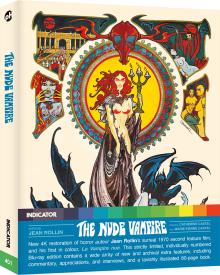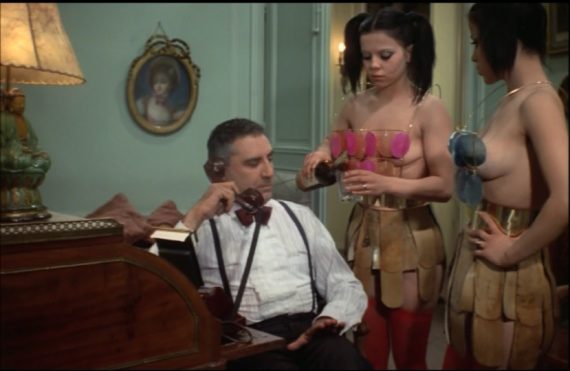 Director: Jean Rollin
Director: Jean Rollin
Screenplay: Jean Rollin
Starring: Christine Cartier (billed as Christine Francois), Olivier Rollin (as Olivier Martin), Maurice Lemaitre, Bernard Musson, Jean Aron, Ursule Pauly, Catherine Castel (as Cathy Tricot), Marie-Pierre Castel (as Pony Tricot)
Country: France
Running time: 85 mins
Year: 1970
BBFC Certificate: 18
The Nude Vampire was only French auteur Jean Rollin’s second feature, and his first in colour, but already the themes and other staple features of his work are well formed and used to great effect. Here we have vampires (albeit with a sci-fi twist and not quite as the description suggests), atmospheric locations (here those evocative Rollin staples a castle, a graveyard and a beach and ocean), eroticism, a poetic, surreal and dreamlike quality, and some of the fabulous actors who Rollin frequently worked with such as the Castel twins, Marie-Pierre and Catherine. All elements that feature throughout Rollin’s impressive catalogue of films.
It’s remarkable that so much of what Rollin is celebrated for in his vampire series is on the screen in just his second feature – with a number of the pieces of the puzzle also featuring in his 1968 debut The Rape of the Vampire.

The Nude Vampire opens with a pre-credits sequence in which three masked scientists take the blood of a naked, and also masked, woman. After the opening titles we see a woman (Christine Cartier) in an orange nightgown walking through the streets at night, stalked by people in sinister animal masks. It’s an incredibly striking opening, full of atmosphere, creepy silhouettes on walls, and a sense of unease.
The woman comes across a man, whom we later discover is called Pierre (played by Rollin’s brother Olivier, here credited as Olivier Martin) who tries to save her, but he’s unable to and the woman is shot by the masked men, and then taken into a building which Pierre is unable to enter. Pierre is driven to try to unravel the mystery of what he’s just witnessed and get into the building; a mystery which encompasses experiments, more vampires, and a discovery that his father is involved. Throughout the journey we discover the woman is alive and has an unknown blood condition which effectively mean she is a vampire (no spoilers, but the reality isn’t quite as it seems once we get to the final act). The experiments are being used to try to find a cure for the disease, whilst the woman is also being kept hidden from others for reasons that take a while to become apparent.

In several of the extras, Rollin shares his inspirations and one is the works of Georges Franju, who directed Eyes Without a Face amongst others, and whose 1963 crime film remake Judex inspired the opening chase sequence. But as well as taking inspiration from cinema’s past, The Nude Vampire is also ahead of its time, and bears an uncanny resemblance to elements of Stanley Kubrick’s excellent final film, 1999’s Eyes Wide Shut. In Kubrick’s film, Tom Cruise’s character is sexually frustrated and tries to get into a high society cult, and that’s just what Pierre is trying to do in Rollin’s feature, albeit for different reasons. Both films also feature masks prominently. These similarities are eloquently outlined in the booklet essay by David Jenkins included in this Indicator edition of The Nude Vampire, and his take on the film is one that I very much subscribe to.
The visuals in Jean Rollin movies are often quite rightly lauded, and this is certainly a feast for the senses, from some effective lighting in the opening night-time chase sequence to the gorgeous locations, which are a joy, not least a castle, which is incredibly gothic and eye-catching. The lighting towards the end of the film is also fantastic, torches of fire used to great effect. The costume design is also striking, particularly the masked costumes and outfits worn by the Castel twins, in their Rollin film debut, which have to be seen to be believed.

The film oozes atmosphere, supported by those visuals, and the atmosphere takes hold from the get-go with the memorable chase sequence opening. The atmosphere is also helped no end by the locations, and some eerie sequences all of which build to the memorable finale which takes place under overcast skies on a beach. No spoilers, other than to say that it is here where the sci-fi elements come into play making us question what we’ve seen to some extent and also revealing the truth about the vampires. Special mention too for the jazzy, sometimes catchy and sometimes off-kilter, score.
In closing, The Nude Vampire is one of my favourite Jean Rollin films. It features many of the wonderful pieces that make up a Rollin film; some eye catching imagery and locations, gorgeous lighting, costumes and production design, an intriguing plot and a heavy dose of atmosphere, all of which gels to leave a lasting impression.
Film: 




The Nude Vampire is released by Powerhouse Films on their Indicator label on 22nd April 2024 in separate limited edition 4K and Blu-ray editions. I watched the Blu-ray edition. The brand new restoration by Powerhouse Films is a revelation, the best I’ve seen the film look. Picture quality is outstanding throughout, with not a blemish, and the detail comes through strongly and colours pop. It’s a fabulous restoration. The audio is also great. Two versions of the movie are included, the French language version, and the English language version, which features alternative credits and switches the pre-credits and title sequences around but is otherwise the same film.
INDICATOR LIMITED EDITION BLU-RAY SPECIAL FEATURES
Brand-new 4K restoration from the original negative by Powerhouse Films
Original French and English mono soundtracks
Audio commentary with film historians Kevin Lyons and Jonathan Rigby (2024)
Jean Rollin Introduces ‘The Nude Vampire’ (1998)
Le Passage (2024): updated documentary on the making of The Nude Vampire by Rollin’s personal assistant, Daniel Gouyette, including interviews with key collaborators Natalie Perrey, Jean-Noël Delamarre, and Jean-Pierre Bouyxou
Fragment d’un dialogue (2024): extracts from selected interviews with Rollin conducted by Gouyette between 1998 and 2003
Interview with archivist Lucas Balbo exploring Rollin’s connection to the French anarchist union (2024)
Critical appreciation by author and film historian Virginie Sélavy (2024)
Original French and English theatrical trailers
Image gallery: promotional and publicity material, and behind the scenes
New and improved English translation subtitles for the French soundtrack
New and improved English subtitles for the deaf and hard of hearing
Limited edition exclusive 80-page book with a selection of new and archival writing including a new essay by David Jenkins, an archival introduction by director Jean Rollin, an archival interview with Rollin, and full film credits.
Limited edition of 10,000 individually numbered units (6,000 4K UHDs and 4,000 Blu-rays) for the UK and US

The commentary is outstanding. Kevin Lyons and Jonathan Rigby complement each other well and provide us with a vast array of information. We hear about the director’s influences and how some made it to the screen, a critical appraisal of the film, a look at the actors who feature and some scene-specific commentary. The sci-fi elements are touched upon, as are the only elements which bring the film down a notch, the exposition scenes where the drive of the film grinds to a halt to explain what’s going on. We also hear some context about the time the film was made and plenty of takes on the plot and visuals – it’s a fabulous commentary, easily the standout extra on the disc.
The five minute intro with Rollin dates from 1998, is like the other intros on discs of his features, brief but with some nice memories, anecdotes and other trinkets of information.
Le Passage runs for nine minutes and features interviews with key Rollin collaborators. It’s an updated version of an archival documentary. There are some nice recollections about collaborators on the film, and a neat ending focusing on the sci-fi elements of the movie.
Fragment d’un dialogue features extracts from interviews with Rollin dating from 1998-2003. Rollin is always a joy to listen to and this is no different, with some nice memories about his childhood, inspirations, his favourite of the films he made (Requiem for a Vampire), the difference between filmmaking and book writing and much more. There’s plenty to take away from this 19 minute piece.
An anarchist vampire in Paris features personal recollections of the film from archivist Lucas Balbo. The six minute piece is breezy but the warmth and affection Balbo has for the director and this film shine through.
Countercultural Gothic runs for 10 minutes and sees Virginie Selavy provide a brief but packed overview of the film, Rollin’s inspirations (including the aforementioned Georges Franju, who directed the classic Eyes Without a Face), the critical response and more. After the commentary, this is the best feature on the disc for me, although the archival Rollin interviews aren’t too far behind.
Rounding out the on-disc supplements are two four minute trailers for the French and English theatrical releases, and three wonderful galleries of images. The first features more than 100 promotional images, including black and white and colour stills, posters and artwork for home video releases. Next, around 60 behind the scenes images, and finally the additional photography gallery is separate as the images, production stills and behind the scenes photography, are of a lower resolution. There are some fascinating images in the collection.
The booklet is a typically excellent one from Indicator, beautifully illustrated throughout. It opens with that aforementioned new essay by David Jenkins, which provides a brief introduction to Rollin’s vampire movies, and gives an overview of the film, and it’s here where we get that likening to the central conceit of Kubrick’s Eyes Wide Shut. It also explores some of the themes of The Nude Vampire and is a great opener to the booklet. A 1997 introduction from Rollin follows, which outlines some of the personal challenges he faced at the outset of making the film. Rollin shares his favourite images, memories of some of the shoot, some of the actors and of the release. Rollin again features in a 1972 interview, where he shares some interesting comments, including about his love of the sea and sandy beaches, locations which he made iconic in so many films. There’s a decent chunk on Requiem for a Vampire, his most recent film at the time of the interview. Next is a lengthier Rollin interview from 1996, in the run-up to the release of Two Orphan Vampires. We get more on beaches, some of Rollin’s influences, childhood film memories, his response to criticism of dalliances with more adult cinema, and much more. Fascinating stuff. Jeff Billington provides an interesting piece on Rollin’s mentor and collaborator Maurice Lemaitre and the Lettrist movement, and the booklet closes with some critical responses.
The Nude Vampire is an excellent Jean Rollin film, featuring his usual surreal and dreamlike quality, mesmerising and memorable visuals, a jazzy score, and an entertaining mystery, all wrapped up amongst many of the themes and imagery that Rollin would become known for throughout his career. The Indicator release is first class, with a fantastic new restoration, beautiful packaging and a well curated collection of on-disc extras, supported by a typically brilliant booklet. This, together with the same day release of The Demoniacs means we now have eight limited edition releases of Rollin films on the Indicator label with many more to come. It’s already a truly remarkable and masterfully produced series and I look forward with excitement to what Indicator have in store for other films by the director.
Disc/package: 






Leave a Reply